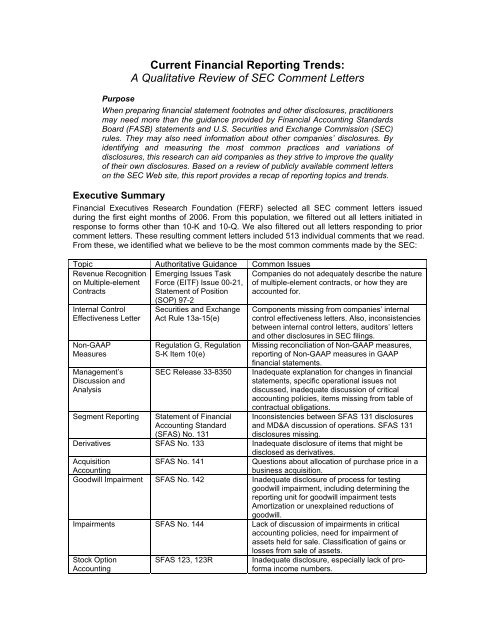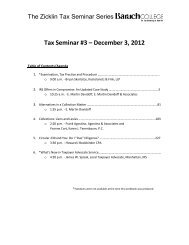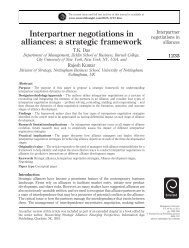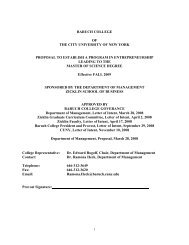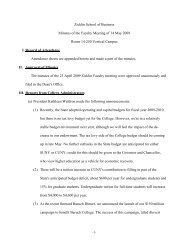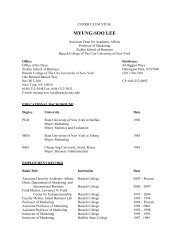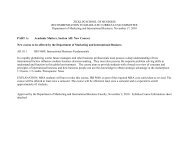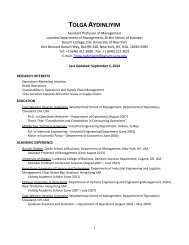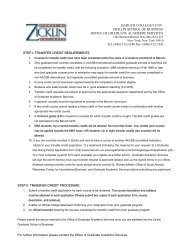Current Financial Reporting Trends
Current Financial Reporting Trends: - Zicklin School of Business
Current Financial Reporting Trends: - Zicklin School of Business
- No tags were found...
Create successful ePaper yourself
Turn your PDF publications into a flip-book with our unique Google optimized e-Paper software.
<strong>Current</strong> <strong>Financial</strong> <strong>Reporting</strong> <strong>Trends</strong>:<br />
A Qualitative Review of SEC Comment Letters<br />
Purpose<br />
When preparing financial statement footnotes and other disclosures, practitioners<br />
may need more than the guidance provided by <strong>Financial</strong> Accounting Standards<br />
Board (FASB) statements and U.S. Securities and Exchange Commission (SEC)<br />
rules. They may also need information about other companies’ disclosures. By<br />
identifying and measuring the most common practices and variations of<br />
disclosures, this research can aid companies as they strive to improve the quality<br />
of their own disclosures. Based on a review of publicly available comment letters<br />
on the SEC Web site, this report provides a recap of reporting topics and trends.<br />
Executive Summary<br />
<strong>Financial</strong> Executives Research Foundation (FERF) selected all SEC comment letters issued<br />
during the first eight months of 2006. From this population, we filtered out all letters initiated in<br />
response to forms other than 10-K and 10-Q. We also filtered out all letters responding to prior<br />
comment letters. These resulting comment letters included 513 individual comments that we read.<br />
From these, we identified what we believe to be the most common comments made by the SEC:<br />
Topic Authoritative Guidance Common Issues<br />
Revenue Recognition<br />
on Multiple-element<br />
Contracts<br />
Emerging Issues Task<br />
Force (EITF) Issue 00-21,<br />
Statement of Position<br />
Companies do not adequately describe the nature<br />
of multiple-element contracts, or how they are<br />
accounted for.<br />
Internal Control<br />
Effectiveness Letter<br />
Non-GAAP<br />
Measures<br />
Management’s<br />
Discussion and<br />
Analysis<br />
Segment <strong>Reporting</strong><br />
(SOP) 97-2<br />
Securities and Exchange<br />
Act Rule 13a-15(e)<br />
Regulation G, Regulation<br />
S-K Item 10(e)<br />
SEC Release 33-8350<br />
Statement of <strong>Financial</strong><br />
Accounting Standard<br />
(SFAS) No. 131<br />
Components missing from companies’ internal<br />
control effectiveness letters. Also, inconsistencies<br />
between internal control letters, auditors’ letters<br />
and other disclosures in SEC filings.<br />
Missing reconciliation of Non-GAAP measures,<br />
reporting of Non-GAAP measures in GAAP<br />
financial statements.<br />
Inadequate explanation for changes in financial<br />
statements, specific operational issues not<br />
discussed, inadequate discussion of critical<br />
accounting policies, items missing from table of<br />
contractual obligations.<br />
Inconsistencies between SFAS 131 disclosures<br />
and MD&A discussion of operations. SFAS 131<br />
disclosures missing.<br />
Derivatives SFAS No. 133 Inadequate disclosure of items that might be<br />
disclosed as derivatives.<br />
Acquisition<br />
Accounting<br />
SFAS No. 141<br />
Questions about allocation of purchase price in a<br />
business acquisition.<br />
Goodwill Impairment SFAS No. 142 Inadequate disclosure of process for testing<br />
goodwill impairment, including determining the<br />
reporting unit for goodwill impairment tests<br />
Amortization or unexplained reductions of<br />
goodwill.<br />
Impairments SFAS No. 144 Lack of discussion of impairments in critical<br />
accounting policies, need for impairment of<br />
assets held for sale. Classification of gains or<br />
losses from sale of assets.<br />
Stock Option<br />
Accounting<br />
SFAS 123, 123R<br />
Inadequate disclosure, especially lack of proforma<br />
income numbers.


